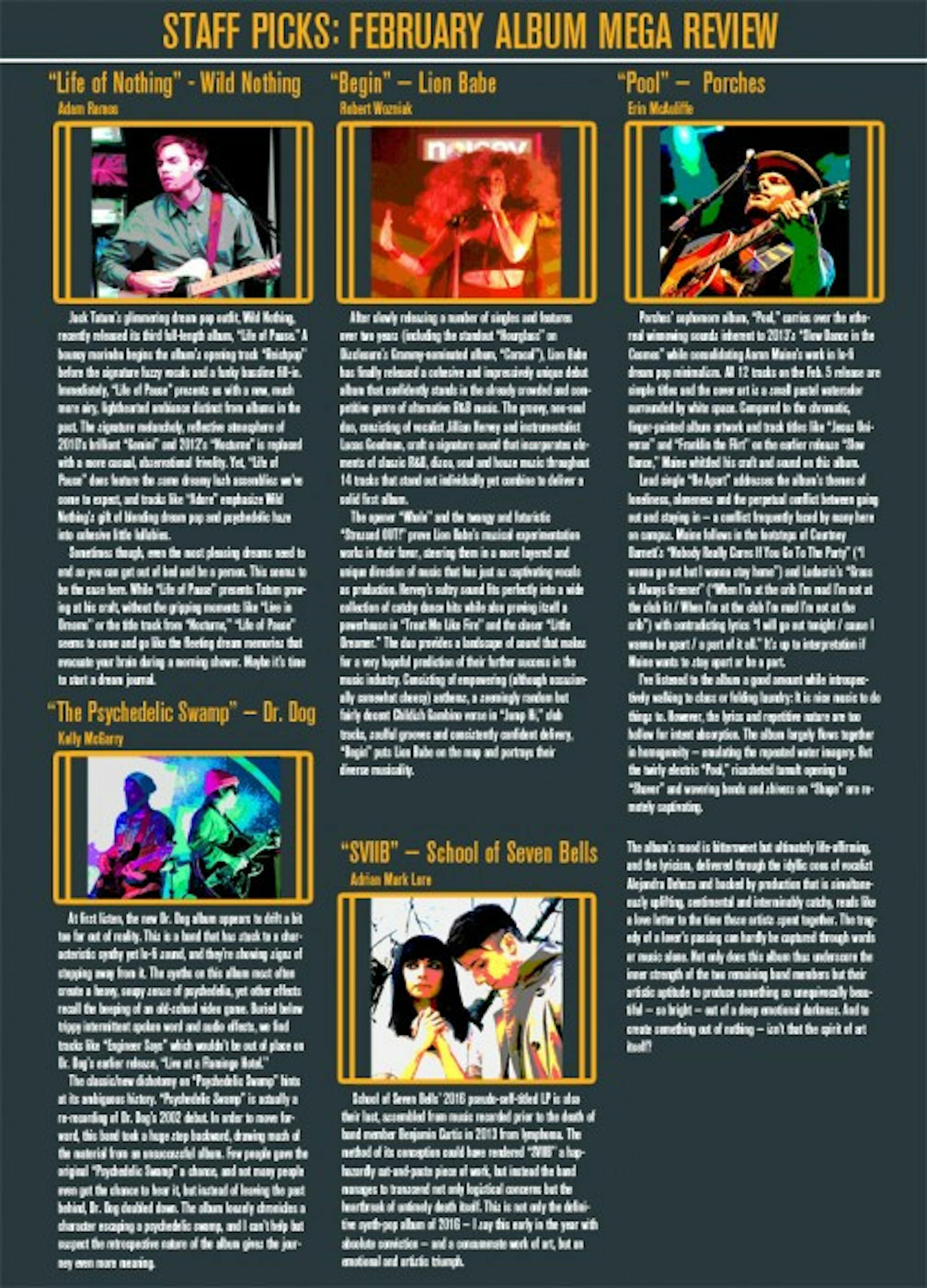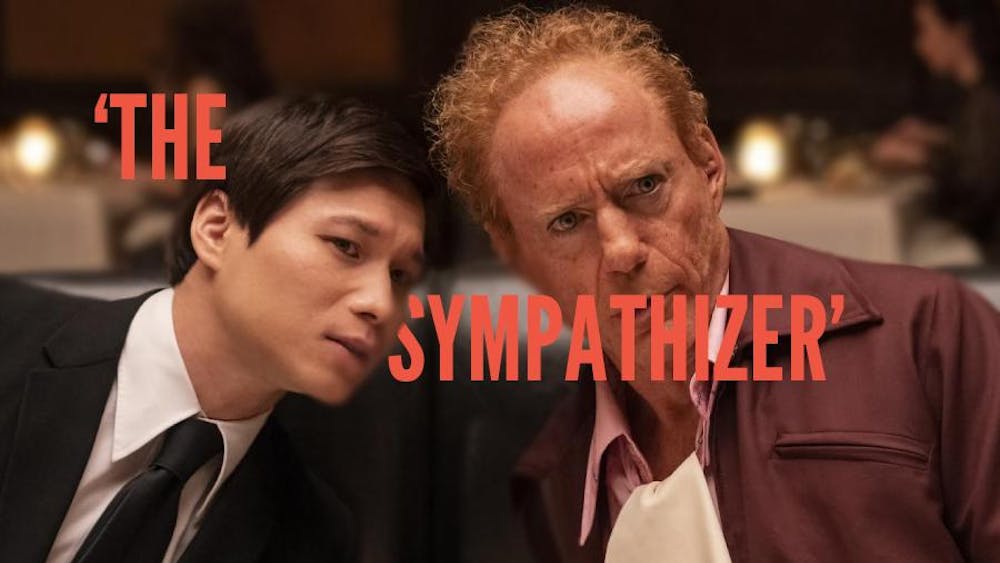
Adam Ramos
Jack Tatum’s glimmering dream pop outfit, Wild Nothing, recently released its third full-length album, “Life of Pause.” A bouncy marimba begins the album’s opening track “Reichpop” before the signature fuzzy vocals and a funky bassline fill-in. Immediately, “Life of Pause” presents us with a new, much more airy, lighthearted ambiance distinct from albums in the past. The signature melancholy, reflective atmosphere of 2010’s brilliant “Gemini” and 2012’s “Nocturne” is replaced with a more casual, observational frivolity. Yet, “Life of Pause” does feature the same dreamy lush assemblies we’ve come to expect, and tracks like “Adore” emphasize Wild Nothing’s gift of blending dream pop and psychedelic haze into cohesive little lullabies.
Sometimes though, even the most pleasing dreams need to end so you can get out of bed and be a person. This seems to be the case here. While “Life of Pause” presents Tatum growing at his craft, without the gripping moments like “Live in Dreams” or the title track from “Nocturne,” “Life of Pause” seems to come and go like the fleeting dream memories that evacuate your brain during a morning shower. Maybe it’s time to start a dream journal.
“Begin” — Lion Babe
Robert Wozniak
After slowly releasing a number of singles and features over two years (including the standout “Hourglass” on Disclosure’s Grammy-nominated album, “Caracal”), Lion Babe has finally released a cohesive and impressively unique debut album that confidently stands in the already crowded and competitive genre of alternative R&B music. The groovy, neo-soul duo, consisting of vocalist Jillian Hervey and instrumentalist Lucas Goodman, craft a signature sound that incorporates elements of classic R&B, disco, soul and house music throughout 14 tracks that stand out individually yet combine to deliver a solid first album.
The opener “Whole” and the twangy and futuristic “Stressed OUT!” prove Lion Babe’s musical experimentation works in their favor, steering them in a more layered and unique direction of music that has just as captivating vocals as production. Hervey’s sultry sound fits perfectly into a wide collection of catchy dance hits while also proving itself a powerhouse in “Treat Me Like Fire” and the closer “Little Dreamer.” The duo provides a landscape of sound that makes for a very hopeful prediction of their further success in the music industry. Consisting of empowering (although occasionally somewhat cheesy) anthems, a seemingly random but fairly decent Childish Gambino verse in “Jump Hi,” club tracks, soulful grooves and consistently confident delivery, “Begin” puts Lion Babe on the map and portrays their diverse musicality.
“SVIIB” — School of Seven Bells
Adrian Mark Lore
School of Seven Bells’ 2016 pseudo-self-titled LP is also their last, assembled from music recorded prior to the death of band member Benjamin Curtis in 2013 from lymphoma. The method of its conception could have rendered “SVIIB” a haphazardly cut-and-paste piece of work, but instead the band manages to transcend not only logistical concerns but the heartbreak of untimely death itself. This is not only the definitive synth-pop album of 2016 — I say this early in the year with absolute conviction — and a consummate work of art, but an emotional and artistic triumph.
The album’s mood is bittersweet but ultimately life-affirming, and the lyricism, delivered through the idyllic coos of vocalist Alejandra Deheza and backed by production that is simultaneously uplifting, sentimental and interminably catchy, reads like a love letter to the time these artists spent together. The tragedy of a lover’s passing can hardly be captured through words or music alone. Not only does this album thus underscore the inner strength of the two remaining band members but their artistic aptitude to produce something so unequivocally beautiful — so bright — out of a deep emotional darkness. And to create something out of nothing — isn’t that the spirit of art itself?
“The Psychedelic Swamp” — Dr. Dog
Kelly McGarry
At first listen, the new Dr. Dog album appears to drift a bit too far out of reality. This is a band that has stuck to a characteristic synthy yet lo-fi sound, and they’re showing signs of stepping away from it. The synths on this album most often create a heavy, soupy sense of psychedelia, yet other effects recall the beeping of an old-school video game. Buried below trippy intermittent spoken word and audio effects, we find tracks like “Engineer Says” which wouldn’t be out of place on Dr. Dog’s earlier release, “Live at a Flamingo Hotel.”
The classic/new dichotomy on “Psychedelic Swamp” hints at its ambiguous history. “Psychedelic Swamp” is actually a re-recording of Dr. Dog’s 2002 debut. In order to move forward, this band took a huge step backward, drawing much of the material from an unsuccessful album. Few people gave the original “Psychedelic Swamp” a chance, and not many people even got the chance to hear it, but instead of leaving the past behind, Dr. Dog doubled down. The album loosely chronicles a character escaping a psychedelic swamp, and I can’t help but suspect the retrospective nature of the album gives the journey even more meaning.
“Pool” — Porches
Erin McAuliffe
Porches’ sophomore album, “Pool,” carries over the ethereal winnowing sounds inherent to 2013’s “Slow Dance in the Cosmos” while consolidating Aaron Maine’s work in lo-fi dream pop minimalism. All 12 tracks on the Feb. 5 release are simple titles and the cover art is a small pastel watercolor surrounded by white space. Compared to the chromatic, finger-painted album artwork and track titles like “Jesus Universe” and “Franklin the Flirt” on the earlier release “Slow Dance,” Maine whittled his craft and sound on this album.
Lead single “Be Apart” addresses the album’s themes of loneliness, aloneness and the perpetual conflict between going out and staying in — a conflict frequently faced by many here on campus. Maine follows in the footsteps of Courtney Barnett’s “Nobody Really Cares If You Go To The Party” (“I wanna go out but I wanna stay home”) and Ludacris’s “Grass is Always Greener” (“When I’m at the crib I’m mad I’m not at the club lit / When I’m at the club I’m mad I’m not at the crib”) with contradicting lyrics “I will go out tonight / cause I wanna be apart / a part of it all.” It’s up to interpretation if Maine wants to stay apart or be a part.
I’ve listened to the album a good amount while introspectively walking to class or folding laundry: It is nice music to do things to. However, the lyrics and repetitive nature are too hollow for intent absorption. The album largely flows together in homogeneity — emulating the repeated water imagery. But the twirly electric “Pool,” ricocheted tumult opening to “Shaver” and wavering bends and shivers on “Shape” are remotely captivating.













